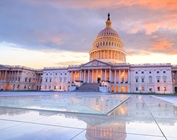
Delivering on one of his signature campaign promises, President Trump signed an executive order (EO), dubbed “Buy American, Hire American,” on April 18, 2017, that focuses on the H-1B visa program and the procurement of American products by federal agencies.
On the “Buy American” front, the EO requires every agency to conduct, within 150 days of the date of the EO, a comprehensive assessment of the monitoring of, enforcement of, and compliance with the Buy American requirements within their respective agencies. The EO acknowledges the existence of several Buy America(n) preference frameworks, which it consolidates for purposes of the new policy position.
The EO further directs the agencies to assess their use of Buy American waivers, to minimize their use of such waivers and, prior to granting a public interest waiver, to assess whether the cost advantage associated with purchasing “a foreign-sourced product is the result of the use of dumped steel, iron, or manufactured goods or the use of injuriously subsidized steel, iron, or manufactured goods,” and to document their findings in any waiver determination. The EO also requires agencies to adopt policies and procedures to maximize the use of US goods, products, and materials in federal procurements.
The EO further directs the Secretary of Commerce and the United States Trade Representative to assess the impact that all US free trade agreements and the World Trade Organization Agreement on Government Procurement have on Buy American requirements within 150 days of the date of the EO and to submit a report to the President detailing their findings within 220 days of the EO date.
The “Hire American” element of the EO requires the Secretary of State, the Attorney General, the Secretary of Labor and the Secretary of Homeland Security to propose new rules and to issue new guidance aimed at protecting the interests of US workers from fraud and abuse. In addition, the EO directs the Secretary of State, the Attorney General, the Secretary of Labor and the Secretary of Homeland Security to suggest reforms to the H-1B program so that visas under the program are granted to “the most-skilled or highest-paid petition beneficiaries.”
As discussed here, government contractors should continue to monitor the administration’s activities with respect to domestic preference requirements, as changes appear to be on the horizon. Government contractors should also remain in strict compliance with domestic preference laws, regulations and contract terms, as the Trump administration appears set on vigorously enforcing existing domestic preference requirements. Finally, while the Buy American directives in the EO seem focused on construction and transportation projects and while it remains to be seen what comes of the report to be submitted to the President, it seems likely that there will be at least some changes to existing domestic preference obligations. And while any changes are not immediately forthcoming, contractors should evaluate their current supply chains so as to be prepared to make necessary adjustments should new domestic preference requirements be implemented.

